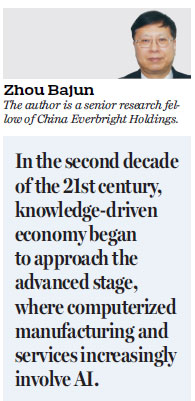HK should play a major role in nation's inno-tech development
Updated: 2018-10-04 06:08
(HK Edition)
|
|||||||
The World Conference on Science Literacy opened in Beijing on Sept 17; while the 2018 World Artificial Intelligence Conference began in Shanghai.
By hosting these important conferences, China has proved once again it attaches great importance to the new phase of the science and technology revolution led by artificial intelligence. As President Xi Jinping points out in his congratulatory messages to the two conferences, science and technology is a primary source of productivity, and innovation is a driving force behind social and economic development. Currently, a new round of science and technology revolution is starting to affect the global development pattern profoundly. A new era in AI-led development is spreading around the world and fueling socio-economic development with new energy that will change people's way of life and production profoundly.
I have been particularly drawn to President Xi's assessment of the new round of science and technology revolution's profound impact on the global socio-economic development pattern and on people's way of life and production.

Since the 1970s, information technology and telecom technology achieved revolutionary advancement. So much so they propelled developed economies to turn from services-driven to knowledge-driven at the turn of the century, where knowledge-intensive industries account for 50 percent or more of a country's GDP.
The categorization of knowledge-driven economy by the Organization for Economic Cooperation and Development is the most widely accepted in the world today. It includes the high-tech sector, the medium-high-tech sector, the telecom industry, the banking and insurance sector, and commercial services (excluding the real-estate service sector). One of their common characteristics is the heavy use of information technology and telecom technology, particularly the constant use of the internet, sometimes referred to as "Internet Plus". The presence of these industries and sectors, generally speaking, makes a knowledge-driven economy at its early stage.
In the second decade of the 21st century, knowledge-driven economy began to approach the advanced stage, where computerized manufacturing (such as 3-D printing) and services increasingly involve AI.
The latest round of sci-tech revolution, led by the advancement of AI, will change people's way of life profoundly. It is not difficult to understand why. It is already affecting the development pattern of the world and requires unprecedented, all-round and profound readjustment of the global economic, financial and political conditions to maintain its development correctly.
Currently, Western developed countries are in a comprehensive crisis of their economic, political and social systems that the world has not seen for 500 years, while managing to stay ahead in the transition from service-driven economy to knowledge-driven economy led by the latest round of sci-tech revolution. Meanwhile, the global paradigm shift from the West to the East continues, with emerging economies such as China growing faster than Western developed economies but still lagging behind as a whole in the latest round of sci-tech revolution. China is only embracing the service-driven economy now and still has a long way to go toward the knowledge-driven economy. The National Bureau of Statistics has not published anything concerning the country's knowledge-driven economy. It shows a big blank in the country's analysis and assessment of how far it is behind Western developed economies in terms of growth quality. Can China achieve its goal of becoming a socialist and modernized major power by the middle of the 21st century? Can it be the driving force behind the global paradigm shift from the West toward the East till it's done? One of the crucial factors in achieving these goals is China's ability to be a frontrunner in inno-tech development.
According to the National Strategy of Innovation-Driven Development, published by the Central Committee of the Communist Party of China and the State Council in May 2016, the country aims to become an innovation-savvy country by the end of 2020 and one of the most innovative countries in the world by the end of 2030. When the People's Republic of China celebrates its 100th anniversary in October 2049, it will be a major world power in sci-tech development. In catching up with the frontrunners in the latest round of sci-tech revolution, China has adopted an asymmetrical approach, which attempts to surpass developed economies on a few rather than all fronts. In this process Hong Kong should be able to take the lead with major mainland cities.
In light of the two important international conferences mentioned above, I suggest Hong Kong step up popularization of science education on the one hand and focus on AI development on the other. Chief Executive Carrie Lam Cheng Yuet-ngor will soon deliver her second Policy Address, in which she should commit more funding for popular science education than before. The special administrative region government should also do its best in fostering AI research and development by coordinating such efforts at local universities and encouraging them to join forces with international R&D institutions to produce applicable results in AI development sooner rather than later. In doing so, Hong Kong should fully utilize its strengths in AI-related legislation, including safety, occupation and ethical standards as well as government supervision and administration of the sector.
(HK Edition 10/04/2018 page4)